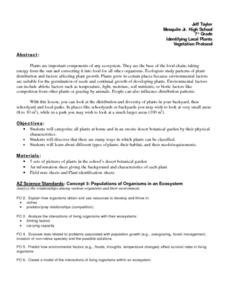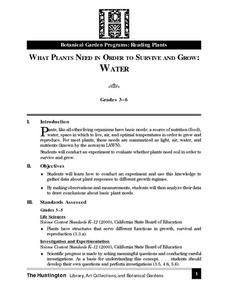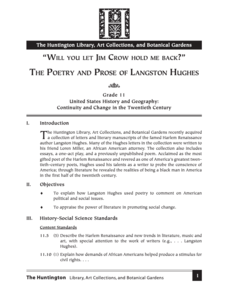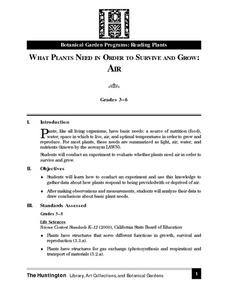Chicago Botanic Garden
Seasons of a Plant
The third in a series of six lessons is an engaging three-part activity defines that discusses phenology, focusing on the cyclic seasons of plants. Pupils then observe phenology outside before determining how climate change can...
Chicago Botanic Garden
Seed Dispersal and Plant Migration
There are five methods of seed dispersal. They include gravity, mechanical, animal, water, and air. Scholars study seed dispersal in instructional activity five of the series of six. Through discussions, hands-on analysis of different...
Chicago Botanic Garden
Plant Phenology Data Analysis
Scientists monitor seasonal changes in plants to better understand their responses to climate change, in turn allowing them to make predictions regarding the future. The last activity in the series of six has scholars analyze BudBurst...
Chicago Botanic Garden
Recent Weather Patterns
Decide whether weather is changing! A two-part activity first challenges classes to review the differences between weather and climate. Once finished, individuals then analyze historical data to determine if climate change is happening...
Chicago Botanic Garden
Causes and Effects of Climate Change
It's time for your class to literally show what they know! Pupils illustrate what they learned about the causes and effects of climate change by filling out a graphic organizer to complete the 5-part series of lessons. They discuss them...
Chicago Botanic Garden
Are All Plants Created Equal?
Photosynthesis requires energy and produces food, and cellular respiration produces energy and requires food. An interesting lesson analyzes the factors that affect the rates of photosynthesis and respiration. Classes spend one day...
Chicago Botanic Garden
Understanding the Greenhouse Effect
The greenhouse effect is important, for without it, life on Earth would not exist. An activity that includes modeling the greenhouse effect and acting out the Earth's energy balance makes up the first part in a series of seven lessons....
Chicago Botanic Garden
Nature Walk and Ecosystem Introduction
A food web has no organism higher than a tertiary consumer because there wouldn't be enough energy left to sustain them. The fourth installment in a seven-part series begins with a nature walk to get pupils thinking about their...
Chicago Botanic Garden
Introducing Ecosystem Services
Ecosystems provide many things humans not only use but also need in order to survive. The last instructional activity in the series of seven introduces scholars to the idea of ecosystem services, that ecosystems provide humans with many...
Curated OER
Abiotic Factors
Learners identify a local plant community and make a variety of measurements. They measure abiotic factors such as taking soil samples and making measurements of weather conditions on the day of the study.
Curated OER
Rooting Into the Soil: Examining the Relationship Between Plants, Soil, And Water
Students, in groups, conduct an experiment to compare how water moves through different soils. They discuss how different soils could have an impact on different plants.
Curated OER
U.S. History: Antebellum Heroes and Villains
Eighth graders research and write reports on key figures of the Antebellum Period. The projects also include pictures, bibliographies, and timelines about their assigned figure. In addition, 8th graders present oral reports to classmates.
Curated OER
Discovering Art-Huntington Gallery Shape
Students study geometric, naturalistic, and abstract shapes. They discuss how various shapes are used in art. They study The Young Fortune Teller by Joshua Reynolds to find various shapes.
Curated OER
A Pressing Project
Students create a collection of pressed plants. In this plant lesson, students use newspaper, plywood, and a rubberband to press plants they previously collected.
Curated OER
Birds, Birds, Birds
Students explore one bird a day and eventually put together a book about each of the birds they learn.
Curated OER
What Plants Need in Order to Survive and Grow: Water
Students conduct an experiment to evaluate whether plants need water to survive and grow. They observe two cactus plants for four weeks, analyzing the results of one plant having received water and the other having received no water.
Curated OER
Learning From Leaves: A Look at Leaf Color
Students cover thermometers with different colored fabric swatches and place them in a sunny location. They record the temperature of each and apply their results to leaf color in plants from different environments.
Curated OER
London Quiz 1
In this London worksheet, high schoolers answer short answer questions about the history and geography of London. Students complete 20 short answer questions.
Curated OER
Practice Multiplying by 6, 7, and 8
In this multiplication practice learning exercise, students sharpen their problem solving skills as they solve 6 story problems that require them to multiply by 6, 7, and 8.
Curated OER
Distances on Coordinate Grids
In this grid worksheet, 5th graders use a grid map with coordinate points to answer six questions regarding distance between locations.
Curated OER
Paul Conrad's Perspective on Civil Rights
Students review a political cartoon and discuss desegregation. In this cartoon analysis activity, 11th graders discuss the impact of a political cartoon and its relation to a Supreme Court case. Students read additional information...
Huntington Library
The Poetry and Prose of Langston Hughes
Eleventh graders discover the poetry of Langston Hughes. In this social issues lesson plan, 11th graders experience the views of Langston Hughes. Students read Hughes' poetry and discuss the basic theme. Students evaluate the political,...
Curated OER
Seed Types
Students dissect seeds. In this seed dissection lesson, students discover the anatomy of seeds. After dissecting seeds, students hypothesize and design the perfect seed to survive in a dry forest.
Curated OER
What Plants Need in Order to Survive and Grow: Air
Students conduct an experiment to determine whether plants need air in order to survive and grow. They discuss natural resources, analyze slides, and observe and record data from the experiment.

























